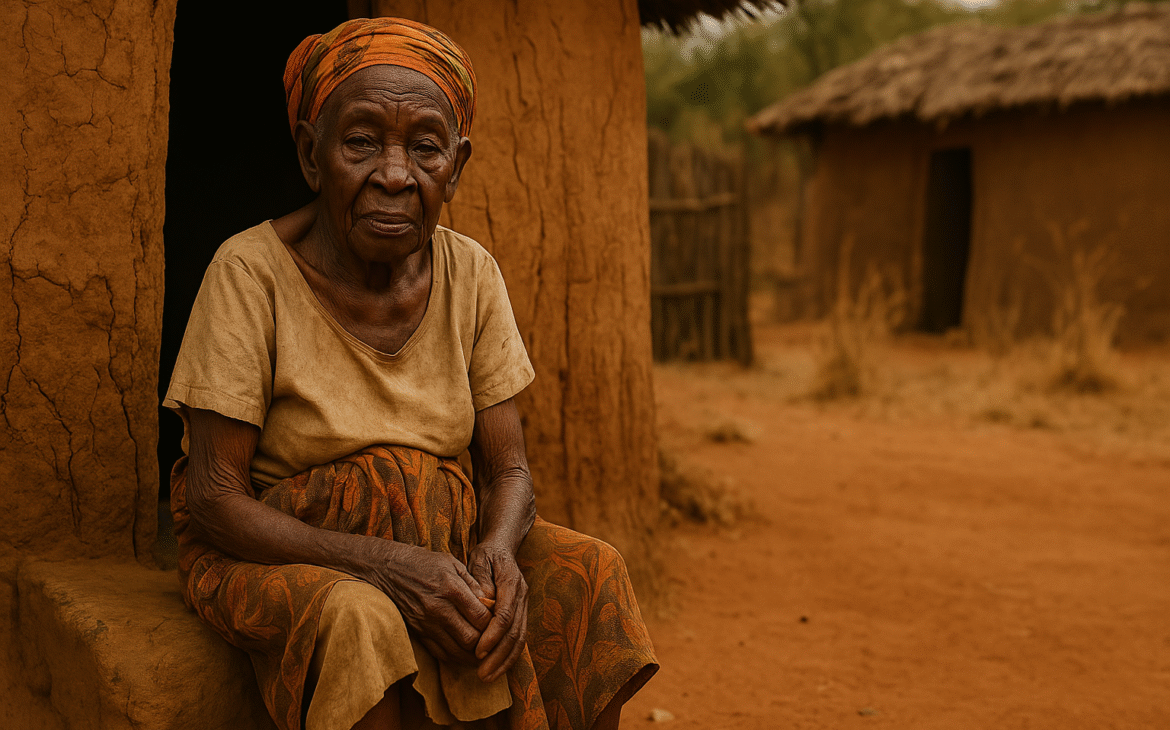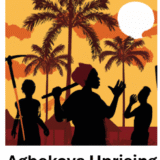Belle No Dey Belleful


I was sitting across from one of my in-laws, my wife’s elder sister’s husband, in his well-worn sitting room. The aroma of a home-cooked meal whirled in the air, the sounds of plates clattering and a gas stove hissing filtering in from the kitchen. He had just returned from a long day’s work, at 70, with a bald head and a lean frame, he still possessed the robust energy of a man half his age – truly as fit as a fiddle. A white tray rested on a low stool before him, holding two humble bowls and a sachet of pure water. He was eating, and deservedly so; a labourer, after all, is worthy of his wage. Wearing simply a white singlet and blue shorts, he listened intently as I voiced my apprehension about driving on the notorious Benin-Auchi Road, a route I vaguely recalled as an expressway in its prime.
He chuckled, a dry, knowing sound that spoke volumes of his septuagenarian wisdom. “Unless something happens, government doesn’t do something,” he stated. He explained that the very portion of the road I was concerned about had been fixed after a grim incident—a trailer swallowed whole by a monstrous pothole. And then there was the Benin-Warri road, swiftly repaired only after the Delta State Governor’s mother tragically met her end there. It was cynical reflection on the reactive nature of governance in the country.
Having spent over 70 years in this city, he was a living archive of its history and its hard-learned lessons. He pointed fingers at the Dangote trucks, those behemoths of commerce, as the primary culprits in the swift disintegration of the roads, often within six months of any repair. When I countered, suggesting the repairs themselves lacked quality, he simply raised an eyebrow. “How could they be?” he asked, a rhetorical question. He painted a vivid picture: a road project awarded for N48 billion, with the Minister siphoning off N10 billion, the Permanent Secretary a cool N1 billion, and the cascade of illicit deductions continuing down to the supervisory engineer, leaving a paltry sum for the contractor to actually execute the work. It was a common tale, sickening in its regularity.
He concluded with a profound statement: “What is unfortunate is that they never learn that ‘belle no dey belleful.’” I asked him to elaborate. He gestured to his almost empty bowl of rice. “Look at this,” he said. “I am filled up. But temporarily. In a couple of hours, I will be hungry again, in need of more food.” The message was clear: no amount of wealth accumulation, no matter how vast, is ever truly enough or satisfying. It’s a futile exercise, this endless amassing, a chase after a fleeting sense of security. It instantly brought to mind the parable of the Rich Fool in Luke 12:16-21.
The Frailty of Age
But how did I arrive at this profound conversation? Our journey to Benin City was spurred by a pressing need to see my mother-in-law, Nene, who had become profoundly debilitated by old age. Her problems were a complex tapestry of decline: incoherent speech, severely limited mobility, periods of unresponsiveness. Our mission was simple, yet daunting: to alleviate her suffering, to coax a few more precious years of joy from her before she transitioned to meet her Creator as we all would some day.
As we unexpectedly entered her room, the sight that greeted us was utterly humbling. There she lay frail on a mattress covered with an impermeable white nylon sheet, her once vibrant form diminished, crumpled in a crouched position, her head barely touching the bed. We had traveled across continents to be with her, and the sight of her daughter, whom she hadn’t seen in years, should have ignited a spark of joy. Yet, her face, etched with the cruel lines of age, was incapable of such expression. Only her voice remained unchanged amidst the wholesale transformation of her being. When my wife gently helped her to sit upright, supporting her, the sheer fragility and the profound futility of our human existence were laid bare for all to see.
Just earlier, this very woman had flown across the world to stay with us. I vividly recall her in our small garden, her back bent, tilling the harsh soil in a futile, yet endearing, attempt to grow yam in our unforgiving climate. My first memory of her is from her home, where she had welcomed us with open arms, frying garri, effortlessly carrying heavy loads of cassava on her bicycle. She was a beacon of independence then, needing no one, instead bustling about, cooking and ensuring our comfort. Later, she came to our house to nurse my wife back to health after the birth of our babies, gently bathing those tiny creatures, applying lotions and generous dusting powders to their delicate bodies. And now, this same woman lay before us, utterly dependent, needing help with even the smallest, most personal tasks.
My wife, with a practiced efficiency born of love, quickly changed into a wrapper, then carefully lifted her mother. With the aid of a Zimmer frame, they navigated the short distance to the bathroom, where my wife lovingly gave her a refreshing bath before dressing her warmly. Lunch arrived, and my emotions swelled as I watched her being helped to a specially prepared seat in the sitting room. The journey to the seat was a monumental task, each step a struggle, and settling her comfortably seemed an even greater challenge. As she sat, she suddenly lurched forward, sending a jolt of adrenaline through me. I darted towards her, ready to catch her, heart pounding. Everyone gasped, but she merely mumbled that she wasn’t about to fall, just trying to bend for comfort. The near-miss left a lingering tremor in the air.
Deterioration: A Universal Truth
This brutal reality of old age had first been driven home during a visit to Dupe’s house, where she dedicated every waking hour to tending to her father, Daddy. I remembered Daddy in his prime: agile, swift, and fiercely independent. So much so that he established a farm in a remote village, far from his Lagos home, where he spent the better part of his active years. Walking into Dupe’s house and seeing him lying in bed, a Zimmer frame neatly folded by his bedside, was alarming. We exchanged pleasantries; he was coherent and cheerful, though the deep lines etched on his face told a different story of prolonged struggle.
When he moved – an infrequent occurrence reserved for necessities like eating, bathing, or easing himself – it was with immense effort. His legs, weary and unsteady, struggled to bear the weight of his upper body, even with the support of the Zimmer frame. A distance a toddler could crawl in seconds took Daddy minutes, each agonizing step leaving him tired, exasperated, and in desperate need of rest to recoup. At the dining table, I tried to cheer him up, recalling shared memories of good old days. The result was a mixed bag – moments of lucidity interspersed with fragmented thoughts. Daddy, once akin to the mighty David who slew Goliath, had grown old and, like the king described in the Bible, “gat no heat.”
iAs I ruminated over my in-law’s poignant words, “belle no dey belleful,” a profound question emerged in my mind: what is the true essence of mankind if, at the end of all our fervent races to acquire wealth, we are ultimately reduced to such fragility? Just a few months earlier, I had witnessed it firsthand. The “Maradona” himself, the most powerful man in the land for eight years, was unable to stand from his wheelchair as he launched his book, “A Journey in Service.” As a ‘yesterday man,’ it must have been a painful experience to be surrounded by the glitterati of today’s power brokers, yet utterly dependent, unable to walk without assistance.
The True Investment for Our Later Years
What, then, is the moral of all these deeply personal, yet universally resonant, experiences? It is this: there is a pressing need to plan for our old age, and this planning should not be anchored in the accumulation of wealth, but rather in the lives we touch with whatever we have. Both Nene and Daddy are not being cared for because of their material possessions, but because of their previous labors and investments in the people – specifically, the women – who are now lovingly burdened with their care. All we truly need for old age is to buy the future, while we still possess the strength and opportunity to do so.
In a world relentlessly driven by the pursuit of material possessions, it is tragically easy to lose sight of what truly sustains us in our most vulnerable moments. The raw, unfiltered stories of Nene and Daddy serve as potent reminders that while wealth can indeed provide comfort and choices, it can never, ever replace the warmth of human connection, the selfless acts of care, and the enduring bonds forged through genuine investment in others.
As we navigate the intricate tapestry of life, let us pause and reflect on this timeless wisdom: “belle no dey belleful.” Our innate hunger for more, for tangible gains, for power, will likely never be fully satisfied by what we simply accumulate. True fulfillment, and indeed, true security in our golden years, resides in the richness of our relationships and the profound impact we have on the lives of those around us. It is time for a fundamental shift in our collective mindset—from frantically amassing fortunes to diligently cultivating a wealth of human connection. For it is these invaluable investments that will truly nourish and sustain us when our own strength inevitably begins to wane.
What do you believe is the most valuable “currency” to invest in for a meaningful and secure old age? Probably wise for us to consider buying immortality





Saf
Well written. A great reminder to us all to invest in the life of the people around us and to reconsider how we want to spend our old age.
Abimbola Ajiboye
Very succinct thought.
bimbo
Thank you sir.